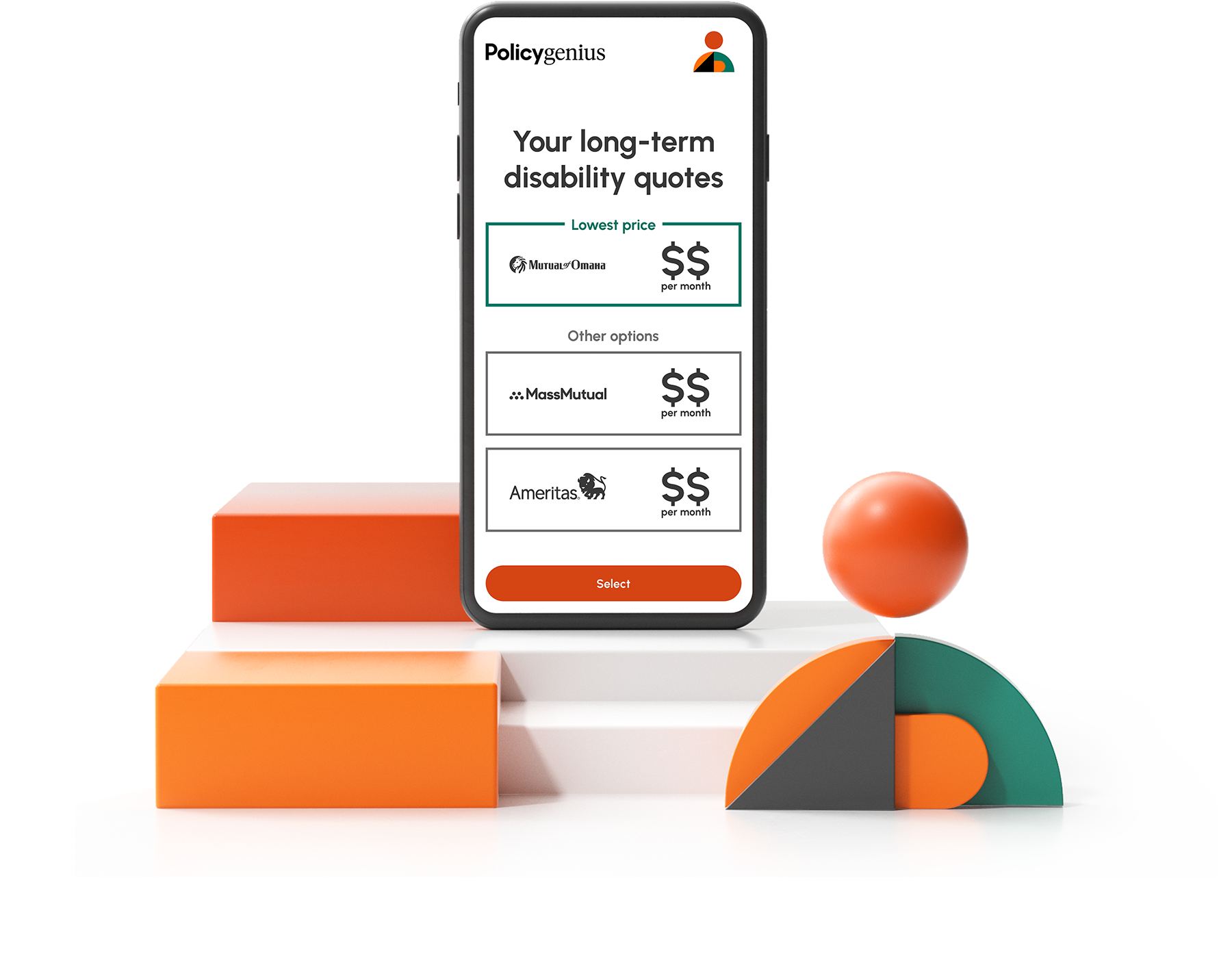What is disability insurance?
Disability insurance replaces your income if you’re sick or injured and can’t work. You can use your disability insurance just like your regular paycheck, so you can avoid falling behind on any expenses if you’re out of a job.
Short-term disability insurance can cover you for a few months, while long-term disability can pay out for years or even decades. Since about 1 in 4 people will become disabled before they retire, having disability insurance can be essential financial protection. [1]
→ Read more about what disability insurance is
How to compare disability insurance quotes
Comparing quotes using a third-party marketplace like Policygenius can help you see rates and coverage options from multiple disability insurance companies at once. This makes it easier to see which disability insurance company offers the best deal.
All you need to do to compare quotes is fill out some basic details about your age, coverage needs, job and income, and health.
Sample disability insurance quote comparison
Comparing disability insurance quotes means you can see estimates from different companies that match your coverage needs and choose the policy that’s best for you.
Let’s take a look at a sample disability insurance quote comparison:
Company A | Company B | Company C | |
|---|---|---|---|
Benefit amount | $9,000 | $9,035 | $8,912 |
Benefit period | To age 65 | To age 65 | To age 65 |
Monthly premium | $401 | $388 | $333 |
Elimination (waiting) period | 90 days | 90 days | 90 days |
What does disability insurance cover?
Disability insurance covers most types of illnesses and injuries that can keep you out of work. While disability insurance won’t cover you if you can’t work because of a pre-existing condition, it will cover things like:
Disability insurance should cover around 60% of your income if you can no longer work. The income you get from an individual disability insurance policy is non-taxable, so the payouts from disability insurance usually come close to your actual take-home pay.
Is disability insurance tax-deductible?
You can’t write off your disability insurance premiums. But, since you already paid taxes on the income you used to buy your disability insurance, you won’t have to pay taxes again on any benefits you collect.
Things work a little differently for disability insurance you get through work. You often pay for this type of coverage with pre-tax dollars, so you'll have to pay taxes on any benefits you collect from an employer-provided policy.
Who needs disability insurance?
Not everyone needs to invest in a disability insurance policy. Disability insurance is best for people who:
Think of it this way — disability insurance protects your income in case you can’t work. The more you earn, the more you have at stake if you become suddenly unable to do your job.
Types of disability insurance
The main types of disability insurance are short-term and long-term disability. The biggest difference between them is how long the payments last.
You can also get supplemental disability insurance, which adds even more protection to short-term or long-term disability policies. If you think your current disability insurance policy isn’t enough coverage to protect your income, you might want to consider adding supplemental disability insurance.
Some people may also be able to get Social Security disability insurance. This type of disability insurance is free, but it can be hard to qualify for and it doesn’t offer nearly the same benefits as a short-term or long-term policy.
→ Read more about the types of disability insurance
How much disability insurance do you need?
You need to get enough disability insurance to keep up your current standard of living. That means you should consider your regular expenses and how much of each paycheck you usually put into savings to calculate the coverage you need.
You may want to consider an own-occupation disability policy for maximum protection. Own-occupation means the policy will still pay out even if you get another job, like if you’re a surgeon and your hand is permanently injured, but you're still able to teach.
An any-occupation or modified own-occupation disability insurance, won’t pay out if you can work another job, even if it’s not the same one you had when you were injured.
Disability insurance riders
You can also add riders to your disability insurance policy, which are additional coverages or changes to your current coverage. Some riders come at no extra cost, while you have to pay to add others.
Some of the most common disability insurance riders include:
Catastrophic disability benefit: Receive extra benefits if your disability keeps you from performing two or more basic living activities.
Cost of living adjustment: Increases your monthly payout as inflation rises.
Future increase option: Lets you increase your coverage later on without going through another medical exam.
Partial disability rider: Allows you to get some of your disability insurance even if you’re still able to perform parts of your job.
Retirement protection: Covers the contributions you normally made to retirement funds, like a 401(k) or IRA.
How much does disability insurance cost?
Disability insurance usually costs between 1% and 3% of your annual pre-tax salary. So, for every $100,000 you make, you can expect to pay between $1,000 and $3,000 a year.
But what you pay for disability insurance also depends on a lot of personal factors, like how old you are, where you live, your gender, your medical history, and your job.
The details of your disability insurance policy also affect how much it costs, like your:
Benefit period: The longer your policy pays out, the more you’ll pay.
Coverage amount: More coverage means more protection, but it also means higher rates.
Elimination period: Also called a waiting period, it’s the amount of time you have to wait between filing a claim and receiving your benefits. A shorter elimination period means higher rates.
Riders: Certain riders (like true own occupation coverage) can be more expensive than others.





